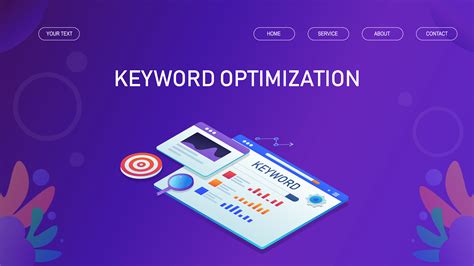Creating a strong online presence for your website is essential in today's competitive digital landscape. To ensure that your website stands out from the crowd and attracts the right audience, it is crucial to employ effective strategies that enhance its visibility in search engine results. By implementing a few simple yet powerful techniques, you can significantly improve your website's ranking and drive organic traffic.
One of the key factors that determine the success of your website is its search engine optimization (SEO). This involves optimizing various aspects of your website, such as its content, structure, and meta tags, to make it more appealing to search engines. By strategically incorporating relevant keywords, creating high-quality and engaging content, and optimizing your website's loading speed, you can enhance its SEO and increase its chances of ranking higher in search engine results.
Another vital aspect to consider is the importance of backlinks. Backlinks are links from other websites that direct users to your site. Search engines view backlinks as a vote of confidence in your website's credibility and relevance. By acquiring high-quality backlinks from reputable websites and influencers in your industry, you can boost your website's authority and improve its search engine ranking. However, it's important to focus on acquiring quality backlinks rather than simply quantity, as spammy or low-quality backlinks can have a negative impact on your website's reputation.
In addition to SEO and backlinks, user experience plays a significant role in determining your website's ranking in search engine results. Search engines aim to provide the best possible results for users, so they prioritize websites that offer a seamless and enjoyable user experience. Ensure that your website is mobile-friendly, with a responsive design that adapts to different devices. Optimize your website's navigation to make it intuitive and user-friendly. By providing a positive user experience, you increase the likelihood of visitors staying on your site longer, engaging with your content, and ultimately boosting your website's search engine ranking.
Enhance your website's performance on mobile devices

With the increasing number of internet users accessing websites via their mobile devices, it has become imperative for businesses to optimize their websites for mobile platforms. By making your website mobile-friendly, you can ensure a seamless user experience and maximize engagement with your target audience.
One way to optimize your website for mobile devices is by implementing a responsive design. This approach allows your website to adapt its layout and content based on the screen size of the device being used. By utilizing fluid grids, flexible images, and CSS media queries, your website will automatically adjust and provide an optimal viewing experience for users on smartphones and tablets.
In addition to responsive design, it is crucial to optimize the loading speed of your website on mobile devices. Mobile users expect quick and efficient browsing experiences, and a slow-loading website can lead to high bounce rates. To improve loading speed, consider minimizing the size of files, compressing images, and enabling browser caching.
Another vital aspect to consider is the navigation and usability of your website on mobile devices. Mobile users have limited screen space, so it's important to simplify the navigation menu and prioritize essential information. Use clear and concise headings, incorporate intuitive touch-friendly buttons, and ensure that your website is easy to navigate with one hand.
Furthermore, don't forget to optimize your content for mobile consumption. Mobile users engage differently with websites compared to desktop users. Keep your paragraphs concise, break up long blocks of text, and use bullet points or numbered lists to enhance readability. Consider using mobile-specific features such as click-to-call or click-to-email buttons to encourage immediate interaction.
By following these mobile optimization techniques, you can enhance your website's performance on mobile devices, provide an exceptional user experience, and ultimately improve your online presence. With mobile devices becoming increasingly prevalent, investing in mobile optimization is crucial for the success of your website in today's digital landscape.
Create Exceptional and Relevant Content
In order to enhance your website's visibility and attract more organic traffic, it is crucial to focus on producing high-quality and pertinent content. A well-crafted and engaging website content plays a pivotal role in improving the overall user experience and driving higher search engine rankings. By consistently delivering valuable information and addressing the needs of your target audience, you can establish your website as a reliable and authoritative source within your industry.
Optimize Your Website with Relevant Keywords

One crucial aspect of improving your website's visibility in search engine results lies in strategically incorporating relevant keywords throughout your online platform. By seamlessly integrating these targeted terms into your website's content, metadata, and URLs, you can enhance your chances of ranking higher in search engine results pages.
When it comes to utilizing keywords, it is essential to research and select the most appropriate ones that specifically relate to your business, products, or services. This process involves identifying the words and phrases that potential visitors or customers are likely to use when searching for information related to your industry.
| Keyword Placement |
|
It is crucial not to overuse or "stuff" keywords throughout your website, as this can lead to a poor user experience and potential penalties by search engines. Instead, focus on creating high-quality, informative content that incorporates relevant keywords in a natural and meaningful way.
Remember, the goal is to optimize your website for both search engines and human users. By effectively utilizing relevant keywords throughout your website, you can increase your visibility, attract targeted traffic, and ultimately improve your online presence and success.
Optimize the Load Time of Your Website
In today's highly competitive online landscape, the speed at which your website loads can significantly impact its performance and user experience. Enhancing the loading speed of your website is crucial for attracting and retaining visitors. By implementing effective speed optimization techniques, you can minimize waiting times, improve user engagement, and boost your website's overall performance.
Streamline your website's code: Optimize and streamline your website's HTML, CSS, and JavaScript code to remove any unnecessary elements or bulky scripts that can slow down the loading speed. Minifying your code and eliminating redundant or unused plugins can greatly reduce the file size, resulting in quicker page loads.
Optimize images and media files: Compressing and optimizing images and other media files is essential for reducing their size without compromising quality. Use image compression techniques, such as reducing the resolution or converting to more efficient file formats, to ensure fast loading times. Additionally, lazy loading images and videos can prioritize loading important content first, improving initial page load speed.
Caching for faster access: Implementing caching mechanisms, such as browser caching and server-side caching, can significantly reduce load times for returning visitors. Caching stores frequently accessed resources, such as images and stylesheets, locally on the visitor's device or server, enabling faster retrieval and reducing the need to fetch data from the server each time.
Enable browser caching: Configuring caching headers and utilizing browser caching techniques allows visitors' browsers to store static resources, such as images, CSS files, and JavaScript, locally. This minimizes the need for repeated requests, resulting in faster load times for subsequent visits to your website.
Optimize server response time: Improve your server's response time by ensuring it is properly configured, using a reliable hosting provider, and optimizing database queries. A slow server response time can significantly delay the loading of your web pages, leading to a poor user experience and potentially affecting your search engine rankings.
Reduce HTTP requests: Minimize the number of HTTP requests needed to load your website by combining multiple CSS and JavaScript files into a single file, reducing the number of external resources required. Additionally, avoid unnecessary redirects and implement asynchronous loading or deferred loading of non-critical scripts, allowing the main content to load first.
Monitor and analyze load speed: Regularly monitor and analyze your website's load speed using various tools and metrics, such as Google's PageSpeed Insights or GTmetrix. These tools provide valuable insights into areas that need improvement and offer suggestions on how to enhance the performance of your website.
By implementing these strategies for optimizing the loading speed of your website, you can provide a seamless user experience, improve your website's overall performance, and potentially increase your search engine rankings.
Maximizing Online Visibility with Effective Linking Strategies

Enhancing the prominence and visibility of your website in online environments is crucial for attracting a wider audience and driving organic traffic. One effective strategy to achieve this is by leveraging the power of linking, both internally and externally. By strategically incorporating internal and external links within your website's content, you can enhance its credibility, improve navigation, and boost search engine rankings.
Internal linking refers to the practice of connecting different pages and sections within your website. When done correctly, internal links provide a seamless browsing experience for users, enabling them to easily navigate through relevant content and discover additional resources. Additionally, internal linking helps search engines understand the structure and hierarchy of your website, making it easier for them to crawl and index your pages.
External linking, on the other hand, involves creating connections with other reputable websites or online resources outside of your own domain. By including relevant external links in your content, you demonstrate to search engines that your website is a valuable source of information, which can positively impact your search engine rankings. Moreover, external links provide additional context and credibility to your content, enhancing its overall quality and attractiveness to users.
When incorporating internal and external links, it is important to ensure that they are relevant, contextual, and add value to the user experience. Avoid overloading your content with excessive or irrelevant links, as this can be perceived as spam by both users and search engines. Instead, focus on linking to reputable, authoritative sources that complement your content and provide further insights to your audience.
In conclusion, by effectively utilizing internal and external links within your website's content, you can significantly improve its visibility and ranking in search engine results. Strive to create a seamless browsing experience for your users through internal linking, while also demonstrating the credibility and value of your content by incorporating relevant external links. By doing so, you can enhance your online presence and attract a wider audience to your website.
Enhance User Experience with a User-Friendly Design
In today's competitive online landscape, it is essential for websites to prioritize user experience. By creating a user-friendly design, website owners can improve customer satisfaction, increase engagement, and ultimately enhance their website's performance in search engine rankings.
One key aspect of a user-friendly design is intuitive navigation. Visitors should be able to easily find the information they are looking for, without feeling overwhelmed or confused. This can be achieved by organizing content into logical categories, using clear and concise labels for navigation menus, and providing a search function for quick access to specific pages.
Another important element of a user-friendly design is responsive and mobile-friendly layout. With the increasing usage of mobile devices for browsing the internet, it is crucial for websites to adapt to different screen sizes and resolutions. Responsive design ensures that the website remains visually appealing and functional across various devices, allowing users to have a seamless experience regardless of the device they are using.
In addition to navigation and responsive design, the overall aesthetics of the website also play a significant role in enhancing user experience. The use of visually appealing graphics, balanced color schemes, and well-chosen typography can create a positive impression on visitors and make the website more engaging. It is important to strike a balance between a visually pleasing design and fast loading times, as slow-loading websites can frustrate users and lead to higher bounce rates.
Furthermore, ensuring that the website is accessible to all users is essential for improving user experience. This includes making the website compatible with screen readers for visually impaired users, providing alt tags for images to assist those with visual impairments, and adhering to web accessibility guidelines. By making the website inclusive, website owners can reach a wider audience and promote a positive user experience for all visitors.
In conclusion, a user-friendly design is integral to enhancing user experience on a website. By prioritizing intuitive navigation, responsive layout, visually appealing aesthetics, and accessibility, website owners can create a positive user experience that not only satisfies visitors but also improves their website's ranking in search engine results.
Consistently Refresh and Sustain Your Website

One essential aspect that significantly influences your online presence and visibility is the regular and ongoing updating and maintenance of your website. Continually refreshing your website with relevant and engaging content ensures that it remains dynamic, current, and attractive to both search engine algorithms and your target audience.
Consider incorporating a content management system (CMS) into your website, allowing you to effortlessly add, modify, or remove content as needed. By leveraging a CMS, you make it simpler to consistently update your website, ensuring that it always showcases accurate and up-to-date information.
Regularly updating your website not only keeps it interesting and informative for visitors, but it also sends positive signals to search engines. Search engine algorithms value fresh and evolving content, and they prioritize websites that demonstrate ongoing activity. Therefore, by consistently updating and maintaining your website, you can improve its search engine visibility and ranking.
- Create a content schedule that includes regular updates, such as weekly blog posts, newsletters, or product updates.
- Take advantage of a variety of media formats, such as videos, infographics, and podcasts, to diversify your content and appeal to different types of audiences.
- Regularly review and optimize your existing website content to ensure it aligns with current industry trends and incorporates relevant keywords.
- Regularly conduct thorough website audits to identify and fix any technical issues, such as broken links, slow page loading times, or mobile responsiveness problems.
- Engage with your audience through comments, feedback forms, and social media platforms to foster a sense of community and encourage repeat visits.
In conclusion, consistently refreshing and maintaining your website through regular updates and content optimization is a fundamental strategy for improving your website's visibility and ranking in search engine results. By investing time and effort into ensuring that your website remains current, engaging, and free from technical issues, you can enhance its appeal to both search engines and your target audience.
Leverage the Power of Social Media to Boost Your Website Visibility
In today's fast-paced digital landscape, having a strong online presence is essential for the success of any business or personal website. To maximize your website's visibility and reach a wider audience, it is crucial to leverage the immense power of social media platforms.
Social media platforms provide a unique opportunity to connect with your target audience, build brand awareness, and promote your website. By strategically utilizing social media, you can drive more traffic to your site and ultimately improve its ranking in search engine results.
Create Engaging and Shareable Content
One of the most effective ways to leverage social media is by creating high-quality, engaging content that users will want to share with their network. Whether it be blog posts, infographics, videos, or images, invest time in producing content that resonates with your audience and provides value.
When crafting content for social media, focus on relevancy, authenticity, and usefulness. Tailor your content to the specific requirements of each platform and encourage users to share it with their followers. The more people engage with and share your content, the higher visibility your website will receive, leading to increased traffic and improved search engine rankings.
Utilize Social Sharing Buttons
To make it easy for users to share your content, make sure to incorporate social sharing buttons on your website. These buttons allow visitors to instantly and effortlessly share your content on their preferred social media platforms with a single click.
Place social sharing buttons in prominent locations on your website, such as at the end of blog posts or on product pages. By enabling seamless sharing, you are not only making it convenient for users to help promote your website but also increasing the likelihood of your content reaching a wider audience.
Engage and Interact with Your Audience
The true power of social media lies in its ability to facilitate two-way communication between you and your audience. Take the time to actively engage with your followers, respond to comments, and answer questions. By fostering genuine connections and building relationships, you can establish yourself as an authority in your niche and encourage loyalty among your audience.
Additionally, participating in relevant online communities, groups, and discussions can help raise awareness about your website and expand your network. By actively contributing to conversations and sharing insights, you can position yourself as a valuable resource and drive traffic back to your website.
Measure and Analyze Your Social Media Efforts
To ensure you are effectively leveraging social media to promote your website, it is crucial to measure and analyze your efforts. Utilize social media analytics tools to track key metrics such as engagement, reach, and click-through rates.
Regularly review these metrics to identify trends, understand what content resonates most with your audience, and adjust your social media strategies accordingly. By consistently analyzing and refining your approach, you can optimize your social media efforts and maximize the visibility and impact of your website.
| Key Takeaways: |
|---|
| - Create engaging and shareable content to encourage social media users to promote your website. |
| - Incorporate social sharing buttons to facilitate easy sharing of your content. |
| - Engage and interact with your audience to build relationships and establish yourself as an authority. |
| - Measure and analyze your social media efforts to optimize your strategies and maximize website visibility. |
FAQ
What are some tips for improving my website ranking in search engine results?
There are several strategies you can follow to improve your website ranking in search engine results. Firstly, make sure your website is mobile-friendly and responsive. Additionally, focus on creating high-quality and relevant content that appeals to your target audience. Implement proper keyword optimization by researching and using relevant keywords throughout your website. Improve your website's loading speed to enhance user experience. Utilize meta tags and descriptions effectively to optimize your website for search engines. Lastly, build high-quality backlinks from reputable websites to improve your website's authority.
Is it important for my website to be mobile-friendly?
Absolutely! In today's digital era, having a mobile-friendly website is crucial for your website's ranking in search engine results. With the increasing use of smartphones and tablets, a significant portion of website traffic comes from mobile devices. Search engines prioritize mobile-friendly websites and rank them higher in search results. Therefore, making your website mobile-friendly will not only improve your ranking but also provide a better user experience for mobile users.
How can I improve the loading speed of my website?
Improving the loading speed of your website is essential for better search engine ranking and user experience. To enhance your website's loading speed, you can start by optimizing image sizes and compressing them without sacrificing quality. Minify CSS and JavaScript files to reduce their file sizes. Implement browser caching to store frequently accessed files and reduce server load. Use a content delivery network (CDN) to deliver your website's content from servers located closer to the user's location. Lastly, choose a reliable and fast web hosting provider that can handle your website's traffic efficiently.
Why is building backlinks important for my website's ranking?
Building backlinks plays a crucial role in improving your website's ranking in search engine results. Backlinks are incoming links from other websites to your own. Search engines consider backlinks as a vote of confidence and authority for your website. When reputable and high-quality websites link to your content, search engines perceive your website as trustworthy and authoritative, resulting in higher rankings. However, it is important to focus on building natural and relevant backlinks rather than engaging in black hat techniques that may harm your website's reputation.



